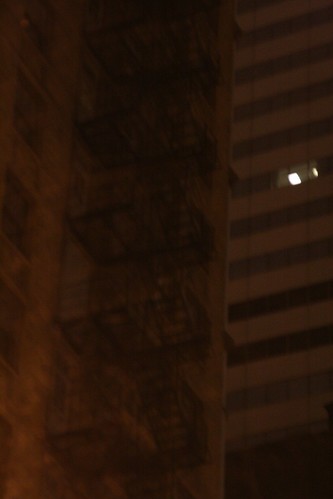 Nowhere in these plans had he foreseen the weight and shock of reality; nothing had warned him that he might be overwhelmed by the swaying, shining vision of a girl he hadn't seen in years, a girl whose every glance and gesture could make his throat fill up with longing ("Wouldn't you like to be loved by me?"), and that then before his very eyes she would dissolve and change into the graceless, suffering creature whose existence he tried every day of his life to deny but whom he knew as well and as painfuly as he knew himself, a gaunt constricted woman whose red eyes flashed reproach, whose false smile in the curtain call was as homely as his own sore feet, his own damp climbing underwear and his own sour smell. "Revolutionary Road," Richard Yates
Nowhere in these plans had he foreseen the weight and shock of reality; nothing had warned him that he might be overwhelmed by the swaying, shining vision of a girl he hadn't seen in years, a girl whose every glance and gesture could make his throat fill up with longing ("Wouldn't you like to be loved by me?"), and that then before his very eyes she would dissolve and change into the graceless, suffering creature whose existence he tried every day of his life to deny but whom he knew as well and as painfuly as he knew himself, a gaunt constricted woman whose red eyes flashed reproach, whose false smile in the curtain call was as homely as his own sore feet, his own damp climbing underwear and his own sour smell. "Revolutionary Road," Richard YatesThe shock-headed man teeters from the screening room, hair of silver nicotined pale yellow, he asks the teenage boy in his company, "Didn't you think it was predictable? Wasn't the ending terrible? Who wrote that? Didn't you know from the start that [plot point] would [plot point]?"
Before the movie (its adaptation of Yates' novel as fine-sliced as translucent prosciutto) I told a colleague that if Sam Mendes' movie were very, very good, I'd want a martini. If it were very, very bad, I'd want a martini. A bartender with ample skills works Sunday nights near home. I hadn't had my Studs Terkel martini since his passing, either.
I shake my head at the unprofessional guest—an Academy member? No, more likely a second A.D. wearing years into middle age—still misunderstanding the movie aloud. I take the elevator sixteen floors down to the street. A train rounds the curve above Wabash Avenue. If I were drinking, the martini would be perfect, it would be balm. Falling, melting snow streaks my cheeks.
[Lake Street east of El, west of Michigan Avenue]